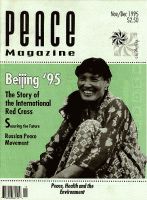
Peace Magazine Nov-Dec 1995, page 27. Some rights reserved.
Search for other articles by Lisa Ferguson here
John Boorman (director)
In 1988, Burma's military dictators allowed only certain tour groups beyond the city of Rangoon. American doctor Laura Bowman (Patricia Arquette), seeking to forget the recent murders of her husband and child, hires an "unofficial" tour guide (local talent U Aung Ko) to get her through the military check points and into the "land of monks and soldiers."
After democracy movement leader Aung San Suu Kyi (Adelle Lutz) stops soldiers from firing on student demonstrators, Bowman learns of a massacre in Rangoon. The students had marched again, but this time the military mowed them down, along with monks and nurses who rushed into the streets to help the wounded. A deserter tells Bowman that soldiers are told the students are communists that's why they shoot them. He fled the army when told to shoot children.
Bowman ends up in a camp near the Thai border where students are sheltered by the Karen, an ethnic group brutalized by the military dictatorship. The refugees suffer from a lack of food and the constant threat of attack, and soldiers shoot anyone trying to cross into Thailand.
Beyond Rangoon is a moving, accurate portrayal of events in Burma in the summer of 1988. But it doesn't tell the whole story. By 1988 Burma had already been torn apart by war for 40 years since it gained independence from Britain. And since then things have only gotten worse. A military regime called the State Law and Order Restoration Council (SLORC) has held power since arresting and disqualifying democratic MPs elected in 1990. The SLORC has killed thousands and displaced 2,000,000 from their homes. Several hundred have fled, but now refugees once welcomed into Thailand are being repatriated and the border is closed. Aung San Suu Kyi, placed under house arrest 10 months before the 1990 election, was released July 10. She remains the country's only hope for peace.
Why has no one heard of the world's longest-running war? As Bowman states, unlike Tiananmen Square the following year, "[the massacre in] Burma wasn't televised, so for most of the world it just didn't happen." This movie, although it doesn't offer any practical suggestions like boycotting Pepsi and other companies that invest in Burma, will at least let the world know what's going on there.
Reviewed by Lisa Ferguson, a Toronto editor and former managing editor of Peace.

Peace Magazine Nov-Dec 1995, page 27. Some rights reserved.
Search for other articles by Lisa Ferguson here